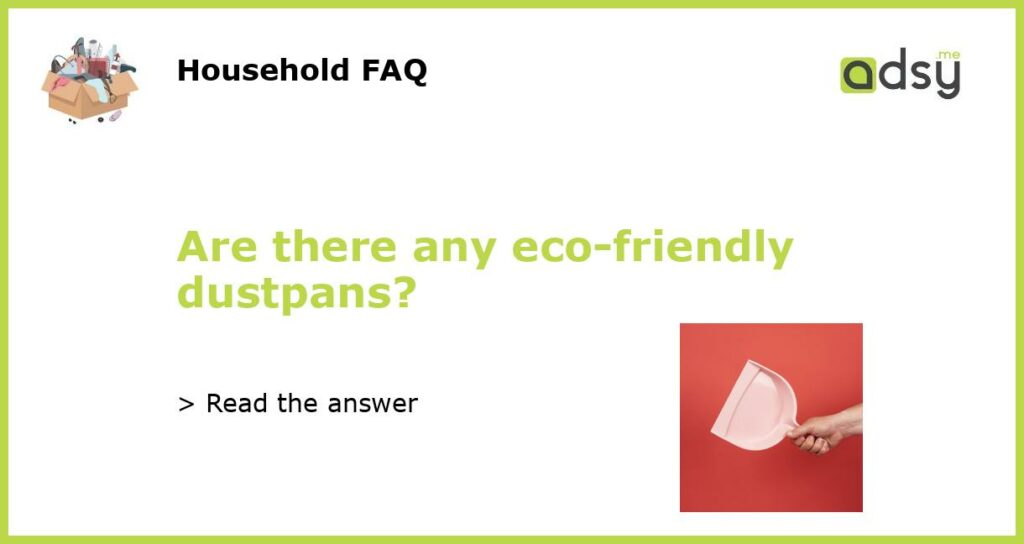Eco-Friendly Dustpans: A Sustainable Cleaning Solution
Now more than ever, people are becoming aware of the importance of living sustainably and reducing their environmental impact. This mindset extends beyond just our daily habits and practices but also encompasses the products we use in our everyday lives. When it comes to cleaning, one essential item that often goes unnoticed is the dustpan. But are there any eco-friendly dustpans available on the market? Let’s explore this question and learn more about sustainable cleaning solutions.
Understanding the Need for Eco-Friendly Dustpans
Traditional dustpans are typically made from plastics, which are derived from petroleum and are non-biodegradable. This means that when these dustpans are thrown away, they contribute to the growing issue of plastic waste in landfills and oceans. As awareness of the environmental consequences of plastic waste has increased, individuals and companies are searching for alternative materials and practices to reduce their carbon footprint.
Exploring Sustainable Materials for Dustpans
To meet the demand for eco-friendly dustpans, manufacturers have started to develop innovative solutions using sustainable materials. Some of the most promising options include:
- Bamboo: Known for its fast growth and renewability, bamboo is a popular choice for eco-friendly dustpans. Its natural properties make it sturdy, lightweight, and biodegradable, making it an excellent alternative to plastic.
- Recycled Plastic: While it might seem contradictory to use recycled plastic for an eco-friendly product, utilizing reclaimed or recycled plastic can help reduce waste and minimize the impact on the environment. By giving recycled plastic a new purpose, it avoids ending up in landfills or oceans.
- Natural Fibers: Dustpans made from natural fibers such as coconut husks or jute provide a sustainable alternative to plastic. These fibers are renewable resources and can be composted at the end of their useful life.
Brands Leading the Way in Eco-Friendly Dustpans
As the demand for sustainable cleaning products rises, several brands are stepping up to offer eco-friendly dustpans. Here are a few noteworthy examples:
- EcoTools: Known for their eco-conscious approach to beauty and cleaning tools, EcoTools offers a range of sustainable dustpans made from bamboo and recycled plastic. Their products are designed with both functionality and environmental preservation in mind.
- Full Circle: Full Circle specializes in creating innovative cleaning tools that are both functional and sustainable. Their eco-friendly dustpans are made from recycled plastic and bamboo, ensuring that you can clean your space without leaving a negative impact on the planet.
- The Forest Stewardship Council (FSC): While not a brand itself, the FSC certifies products made from responsibly sourced materials. Look for the FSC logo on dustpans to ensure they are made from sustainably harvested wood or bamboo.
Maintaining and Disposing of Eco-Friendly Dustpans
Just like traditional dustpans, eco-friendly options require proper maintenance and disposal to ensure their longevity and minimal environmental impact. Here are a few tips:
- Cleaning: Clean your eco-friendly dustpan regularly by wiping it with a damp cloth or rinsing it with water. Avoid using harsh chemicals that can damage the material or cause pollution.
- Storage: Store your dustpan in a dry place to prevent moisture damage and extend its lifespan.
- End of Life: Depending on the material, eco-friendly dustpans can be composted, recycled, or disposed of according to local waste management regulations. If the dustpan is made from bamboo or natural fibers, it can often be composted. If it’s made from recycled plastic, check with your local recycling facility for proper disposal methods.
The Future of Cleaning: Embracing Eco-Friendly Practices
Choosing an eco-friendly dustpan is just one small step towards a more sustainable lifestyle. As consumers demand cleaner and greener alternatives, manufacturers will continue to innovate and offer eco-friendly solutions. By supporting brands that prioritize sustainability and taking proper care of our cleaning tools, we can contribute to creating a healthier planet for future generations.






